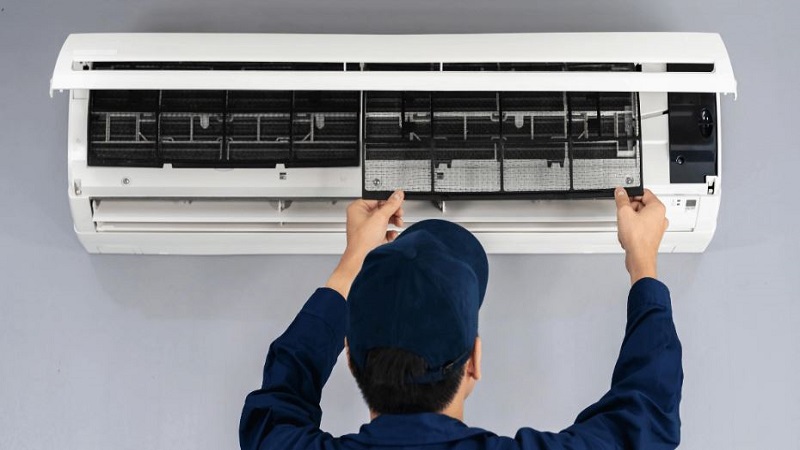Frequent HVAC filter changes are essential for Texas homes due to the state’s intense heat, dust, and allergens. Cooling systems often run nonstop because of high temperatures, leading to clogged filters and reduced efficiency. Dust storms in areas like El Paso add particulates that strain filters further.
High pollen levels from Texas’ diverse vegetation worsen indoor air quality and trigger allergies. Regular filter changes help trap allergens, improve air quality, and ensure peak system performance. In this article, I’m going to share specific challenges for filtering Texas air, why your air filter needs frequent changes, how often should you change, and how to choose the right filter.
TD;LR
- Maintaining HVAC filters regularly will improve air quality, reduce energy bills, and also prolong the life of the system.
- Replace them every 1 to 3 months (more often in Texas because of the high dust pollen and allergen levels). Change filters when airflow is restricted or when energy bills start climbing.
- Companies like The Chill Brothers HVAC Services offer customized maintenance packages that ensure systems are running well.
Challenges specific to Texas
HVAC systems in Texas have unique needs. It means maintenance has become a requirement rather than a choice. HVAC performance and lifespan are severely complicated by its extreme climate, where intense heat, regular dust storms, and seasonal allergens run rampant.
1. Rigorous Temperature and 24/7 Use
Summer in Texas is known to be unforgiving with many days surpassing 100°F. Excessive heat can overwork cooling systems whose operation becomes nearly constant. You need to change filters, maintain the system, and ensure everything works to avoid breakdowns in peak demand time. As Francis Kasper notes: “Regular maintenance can help your HVAC system last longer and run more efficiently.”
Regularly maintain your system with solutions like The Chill Brothers HVAC Services to keep it functional at its best.
2. Frequent Dust Storms
Parts of Texas, especially West Texas and places around El Paso, face unbearable and frequent dust storms. These storms bring tons of debris into the air and subsequently into the HVAC filters. As a result, filters get clogged. Dirty filters lead to bad indoor air quality and higher energy bills. The Chill Brothers’ Award-Winning HVAC Services make sure you stay safe in these dust storms.
3. Spring Allergens
Texas is known for a heavy pollen season from trees, grasses, and wildflowers in the spring. This makes things very uncomfortable for allergy sufferers in particular. Clean filters in HVAC systems are your first layer of protection against allergens.
Why HVAC Filters Matter
HVAC filters are often overlooked, but it is a key component to maintaining indoor air quality. They remove the unwanted particles from the air before passing it indoors. The harsh climate and environmental challenges of Texas make the role of filters even more critical.
- HVAC filters capture particles that are in the air and bring down indoor air pollution.
- Allergens, stubborn dust, and even pet dander are prevented from getting into the room.
- Particularly in Texas with spring allergens and dust storms, filter maintenance is key to improving air quality.
- Dirty filters require them to pull air through harder, resulting in more energy used and less efficient.
- Regularly replacing or cleaning filters helps your HVAC system operate efficiently while extending its lifespan.
- Keeping good quality filters are one of the simplest ways to encourage a healthier immediate household habitat and allows the system to work to its full effectiveness.
How Often Should You Change HVAC Filters?
Changing HVAC filters in the Texas area is mostly dependent upon usage, household size, and environmental conditions. With high levels of dust and allergens throughout the state, Experts like Francis Kasper encourage homeowners to change their filters every 30 – 60 days.
You may need to get them replaced even more often during periods of high-demand. Summer demands the cooling system to run pretty much constantly. Pollen levels get pretty high during spring.
Monthly replacements are also needed in homes with pets, smokers, or allergy sufferers for the best air quality. If you can see visible dirt or clogs in a filter, you should probably change it no matter what the schedule says.
Choosing the Right Filter for Texas Conditions
There are various types & ratings of filters, like
– Fiberglass
– Pleated
– High-efficiency particulate air (HEPA) filters
MERV(Minimum Efficiency Reporting Value) rating indicates a filter’s efficiency. The higher the rating, the smaller the particles they capture. MERV 8 to 13 filters provide a good mix of performance and airflow in Texas. Note that not all HVAC systems can take a high-MERV filter. Always verify that with the manufacturer.
The bottom line is that the extreme heat and allergens that Texas presents make routine maintenance on your HVAC system that much more vital. Following a regular maintenance schedule can help homeowners boost efficiency, improve comfort during every season of the year, and keep the air quality and humidity up to scratch.
